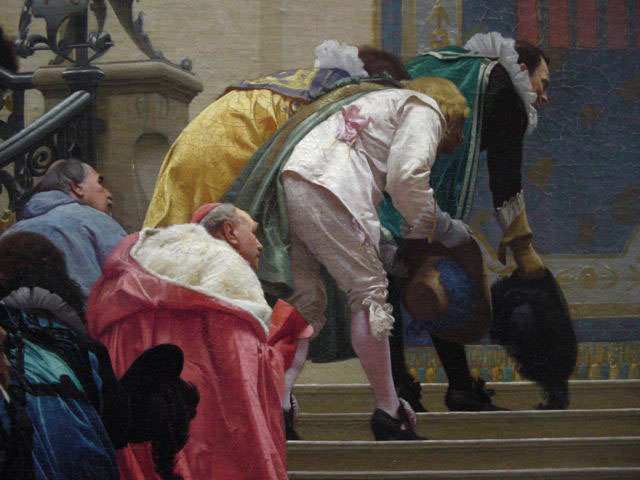
Print, broadcast and social media have a fairly small repertoire of expressions to deploy when fawning over, or seeking to discredit, the bigwigs who lord it over us and, supposedly, lead us. The expression I have just used, hoping for a striking epithet, is first attested in the mid-18th century (already with its tinge of sarcasm, its lack of due deference) when ostentatious wigs were worn by the most important and self-important personages in the land: ‘A new point of discussion for the lawyers, for our big wigs, for their Lordships.’ From the same era and invariably used of Dr Johnson is ‘panjandrum’, from Grand Panjandrum, an invented phrase in a nonsense verse published in 1755 by Samuel Foote*. By the 19th century it had come to refer mockingly to an ‘imposing figure’, especially if puffed-up. Such terms have a comic quality which may not be quite appropriate in the current climate of political rancour, so we revert to the (over) familiar mainstays of journalistic discourse.
With recollections of the notorious fraudster press baron Robert Maxwell featuring in post-Epstein press reports the word magnate has been employed by more than a few journalists. It first appeared in Middle English and derives from late Latin magnas, magnat – great man, and it and its translations formerly defined a class of post-feudal nobility in European lands.
While we are at it, grandee (important, influential male in public life, often applied to elderly, retired, invariably hugely wealthy former politicians of a particular stripe) appeared in the late 16th century, from Spanish and Portuguese grande, senior nobles, from Latin grandis, great. The English ending was by association with the originally French-inspired ending -ee, seen in such formulations as ‘devotee’ and ‘debauchee.’
/Shah_Jahan_1628wiki-56a0424b5f9b58eba4af918d.jpg)
In the same lexical set of possibly overweening, overstated titles as ‘magnate’ and ‘grandee’ is mogul (as in ‘hedge-fund mogul pedophile’ – a recent press caption) which was originally cognate with ‘mongol’ and referred to the Mughal (the Iranian version) dynasties who ruled India between 1526 and 1857 and were thought by Europeans to have vast stores of treasure at their disposal. The word’s suggestion of limitless power coupled with financial profligacy gave us those journalistic cliches of the 1950s, ‘movie mogul’ and ‘Hollywood moguls.’
‘Mogul’, ‘grandee’, ‘magnate’ share a category with tycoon – Japanese taikun, great lord or prince, from Chinese tai great and kiun lord, a designation of the ruling Japanese Shogun used by respectful foreigners, adopted into English in the 1860s, first as an admiring description of a political figure, then, from the 1920s as journalese shorthand for a prominent business leader and/or entrepreneur, especially if perceived as powerful, dynamic and/or aggressive.
On Twitter J-V Vernay asks ‘How about nabob from Nawab?’ In the colonial era in India the word, which later came to mean a returning colonist who had enormously enriched themselves, originally denoted a deputy governor of a province under the Mogul Empire. It is Anglo-Indian, probably adopted via Portuguese nababo from Hindi and Urdu nabab, from the Arabic plural nuwwab meaning viceroys. A wonderful word in its jaunty sound and in its connotations, perhaps bestowed most memorably in this case:
https://www.amazon.com/Nabob-Sob-Very-Johnnie-1951-57/dp/B01AXLWSBE …
Another rather rare but interestingly loaded term for alpha-males in public life is plutocrat, denoting a wielder of power derived from enormous wealth. ‘Plutocracy’ appeared in English in 1631, from the Greek ploutos wealth and -kratia, meaning rule and was widely used to describe the economic and social dominance exercised by late 19th century and early 20th century industrialists in the USA. Potentate is another resonant label from the politico-journalistic lexicon: it began to be used in the 1400s and is formed from Latin potentatus, dominion, from potent, having and/or exercising power.
I should probably mention in passing the honorific I secretly crave for myself: it’s eminence-grise, describing a ‘power-behind-the-throne’, a hidden manipulator of affairs, an arranger working in the shadows, originally referring to His Eminence François Leclerc du Tremblay, who wore a beige robe when that colour was in French described as grey and was the righthand-man of Cardinal Richelieu.

In my previous post I listed some of the disapproving epithets for those in public life who wield power and influence and aspire to or affect greatness but, to put it much too kindly, fall far short. Another term associated with scrutiny of these reprobates which has been trending recently is impostor. ‘Impostor syndrome’ (then known as ‘impostor phenomenon’) was first defined in 1978. The word itself was adopted from French in the 16th century, derived via French imposteur from Latin imponere to impose upon, deceive, swindle. An ‘imposture’ denoted a fraudulent display or adoption of a false persona while the imposter or impostor was the perpetrator. Some, of course, who exhibit symptoms of the syndrome – shiftiness, false bonhomie, exaggerated preening – really are impostors.

*Foote invented the word, which has echoes of Latin or Asiatic tongues, as part of a sequence to test the memory of a fellow-actor: ‘And there were present the Picninnies, and the Joblillies, and the Garyulies and the Grand Panjandrum himself, with the little round button at the top’

